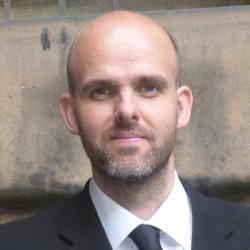Seminar: Protecting motor neurons from degeneration by targeting bioenergetics
Prof Tom Gillingwater , Professor of Anatomy at the Centre for Discovery Brain Sciences and the Euan MacDonald Centre for Motor Neuron Disease Research at the University of Edinburgh
Thursday, 19 October 2023, 11.30am to 12.30pm
West Wing Seminar Room, West Wing of John Radcliffe Hospital, Level 6
Hosted by Professor Kevin Talbot

MDUK OXFORD NEUROMUSCULAR CENTRE SEMINAR SERIES
ATTENDANCE
This seminar is intended for the personnel and students at the University of Oxford and the Oxford University Hospitals Foundation Trust.
Hybrid seminar at the West Wing Seminar Room on Level 6 of the West WIng of the JR Hospital. For the online link, please email chelsea.larabee@idrm.ox.ac.uk.
Students, postdoctoral researchers, and other trainees will be invited to have lunch with Prof Gillingwater following the talk - register here.
ABSTRACT
SPEAKER
Tom graduated in Human Biology [Anatomy] from the University of Leeds before moving to the University of Edinburgh, graduating with a PhD in Neuroscience in 2001. Following a period of postdoctoral research, he was appointed to a Lectureship in Anatomy at the University of Edinburgh in 2004, promoted to a personal chair in 2010, and became the 15th Professor of Anatomy at the University of Edinburgh in 2015 (the Chair of Anatomy was founded in 1705).
Tom graduated from Edinburgh University Business School with an MBA in 2006, and is an elected Fellow of the Royal Society of Edinburgh (FRSE), Anatomical Society (FAS), Royal Society of Biology (FRSB), and Royal Microscopical Society (FRMS).
Tom leads an active research team that has secured in excess of £10million in research funding from a variety of international funding bodies. Tom has authored more than 175 papers in a variety of leading international journals, including Journal of Clinical Investigation, Cell Reports, The Lancet, Nature Cell Biology, eBioMedicine, Neuron, Nature Reviews Neurology, Cell Reports Medicine, Nature Communications, Nature Neuroscience, Brain, Genome Biology, PLoS Genetics, Acta Neuropathologica, Trends in Molecular Medicine, Genome Medicine, Annals of Neurology, Current Biology, American Journal of Human Genetics, Human Molecular Genetics, eLife, and Journal of Neuroscience. He has supervised or co-supervised more than 40 PhD and MSc research students.
Tom has board-level experience from several national and international organisations (including Association Française Contre les Myopathies, the SMA Trust, SMA Europe, Muscular Dystrophy UK, and the Anatomical Society) and sits on the editorial boards of international journals: he has been Editor-in-Chief at the Journal of Anatomy since 2011 and Associate Editor at the Journal of Neuromuscular Diseases since 2013. Tom regularly acts as an expert reviewer for international grant agencies, research journals and academic textbooks. He has served as an external examiner for the University of Glasgow, University of Oxford, RCSI, and NUI Galway, and is an Intercollegiate MRCS Examiner for the Royal College of Surgeons.
Tom’s research laboratory is based in the Centre for Discovery Brain Sciences and the Euan MacDonald Centre for Motor Neuron Disease Research. It focuses on understanding cellular and molecular mechanisms that regulate the form and function of the nervous system in health and disease. Members of the lab routinely combine quantitative imaging (e.g. confocal and electron microscopy) and molecular biology techniques (e.g. proteomics and microarray screens) to study the structure and function of the central and peripheral nervous systems, both in vivo and in vitro. Currently, research efforts are focussed on: i) understanding disease mechanisms and developing new therapies for motor neuron diseases, including spinal muscular atrophy (SMA) and amyotrophic lateral sclerosis (ALS); ii) understanding common cellular and molecular mechanisms that regulate the breakdown of synaptic compartments of neurons across a range of different neurodegenerative conditions; and iii) developing novel imaging strategies for visualising the human nervous system in vivo. Tom is also actively pursuing research aiming to improve standards of anatomy/medical education, and is building international collaborative links to facilitate the utilisation of historical anatomy collections in cutting edge (e.g. genomic) research.


